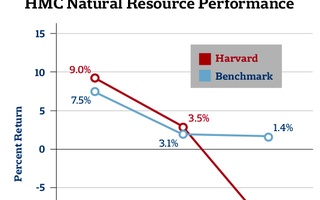{shortcode-096c3140b4a29394b1c2ba8ebe96cd14950c64b1}
Harvard Management Company’s head of natural resources Colin Butterfield said that Harvard is “pausing” investments in some fossil fuels at a Business School event Monday.
During the discussion on the effects of climate change on investments, Butterfield said that Harvard's natural resources portfolio will not likely invest in the fossil fuel industry in the future because those funds do not perform that well financially.
“What I can tell you is, from my area, I could honestly say that I doubt—I can’t say never, because never say never—but I doubt that we would ever make a direct investment with fossil fuels,” he said. “But that’s more of an Investment Committee decision, and I cannot talk on their behalf.”
Butterfield added that Harvard does indirectly invest in fossil fuels through outside funds. Members of the Harvard Corporation indicated in October that the University was moving away from investments in coal because they were not profitable.
Butterfield joined HMC in October 2016 to head the natural resources division of HMC, coming from a background investing in agriculture and timber. At the event, he talked about his own opinions on climate change and its impact on investments. George Serafeim, a Business School professor who does research on Environmental, Social, and Governance—“ESG”— factors to investing, moderated the conversation.
In November, Harvard Management Company set forth to “refine” its investments in natural resources, which include vineyards in California and timber yards in South America. Butterfield said that the natural resources portfolio “is not looking at energy at the moment.”
“For now, we are pausing minerals and oil and gas,” he said.
Butterfield said that climate change is “a huge problem,” and that he actively considers and thinks about it in his role at the helm of HMC’s natural resources.
“I clearly feel that we are stealing from the future generations,” he said. “When you go out there and invest in natural resources, and you start looking at what’s happening in the world of natural resources, it’s pretty scary—we need to have more of these conversations.”
Harvard’s investments in natural resources have been controversial among some student activists, who have demanded that the University divest its endowment from all fossil fuels. Harvard has repeatedly said it will not do so.
In fiscal year 2016, the value of Harvard’s natural resources assets fell by 10.2 percent. That steep decline was part of broader drop at HMC in fiscal year 2016; the value of the University’s endowment fell by almost $2 billion.
Some members of activist group Divest Harvard attended the conversation; one student asked Butterfield about Harvard’s commitment to investing in more sustainable forms of energy and divesting from fossil fuels.
“It’s a huge concern,” Butterfield said.
—Staff writer Julia E. DeBenedictis can be reached at julia.debenedictis@thecrimson.com. Follow her on Twitter @julia_debene.
Read more in University News
Yale’s Annual Endowment Report Defends High Fees for External ManagersRecommended Articles
-
ASK AID FOR BOSTON Y. M. C. A.A canvass of the University dormitories will be made this morning by a committee of the Christian Science Society to
-
CAUSETTE DE LUNDI.If you have ever read "Verdant Green" you will be better able to appreciate Benjamin Emilius Butterfield's state of mind
-
Dissent: An Unnecessary InvestmentAs managers of such enormous endowments, institutions like Yale and Harvard have a responsibility to use their resources to further the mission of the institutions. Investing in companies who profit by destroying our future is incompatible with Harvard’s mission.
-
 HMC to 'Refine' Natural Resources Investing
HMC to 'Refine' Natural Resources Investing -
Harvard, With Its Fossil Fuel Investments, Is Ignoring ScienceComparing Harvard's investment carbon footprint with its campus carbon footprint also demonstrates that divesting from fossil fuels is far from merely symbolic. Indeed, if we accept the importance of reducing our emissions, then we must also accept responsibility for our investments.













